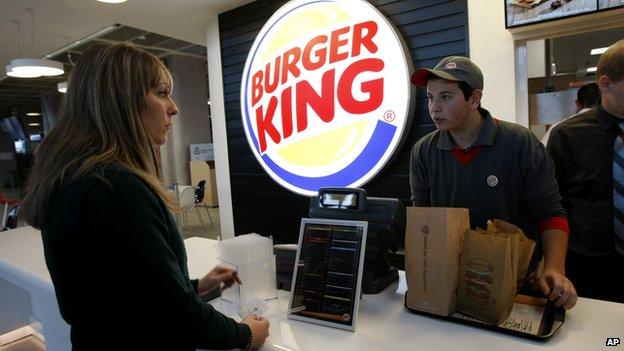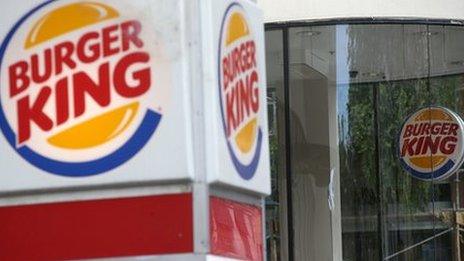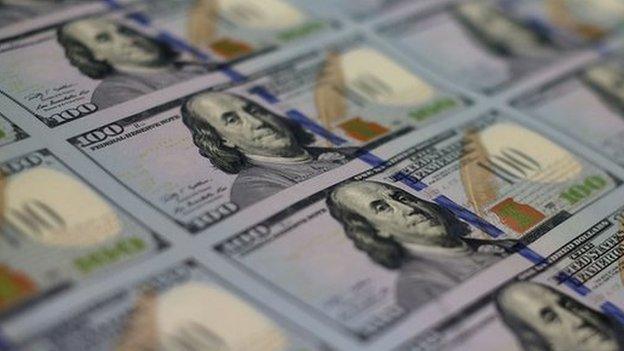Burger King abdicates US citizenship
- Published
- comments

The King has fled the tax man, abandoning his native home.
Corporate tax inversion, in which a US company buys an oversees business and relocates its headquarters there to take advantage of lower tax rates, can be a rather dry topic. But when the company in question is fast food giant Burger King, and the foreign refuge is coffee shop chain Tim Hortons, in the very-much-not-overseas Canada, the story becomes much juicier - even if the truth behind the headlines is a bit more complicated.
The news has some commentators lamenting a golden era when US corporations were red-blooded American patriots.
"In the past, companies felt at least some obligation to do right by the American people, even if that meant forgoing some profits and hurting their shareholders," writes, external the New Republic's Danny Vinik. "That mindset no longer exists. Now, American firms seek out every loophole, so they can squeeze out every dime of after-tax profits."
For those on the right, the current tax-loving administration - not corporations - is to blame. University of Maryland Prof Peter Morici says, external the move is a "direct result of President Obama's anti-business tax policies".
While Burger King is far from the first US company to attempt an inversion merger, it could be in greater danger of fallout from the move because it sells its products directly to the general public, external. And if Burger King's Facebook page is any indication, the US public isn't happy.
"If you attempt to buy Tim Horton's for the purposes of evading US taxes, I will NEVER step foot in another Burger King again," reads, external one post with more than 1,600 likes.
Another calls, external Congress to pass legislation closing all Burger King outlets on US military installations.
In Washington's power corridors, however, the news has been met with a "proverbial shrug", writes, external CNBC's Ben White.
Although Ohio Democratic Senator Sherrod Brown has endorsed, external a public boycott, most of Congress is preoccupied with the upcoming elections and simply passing legislation to keep the government running, he says. President Obama, who railed against corporate inversion as recently as last month, probably isn't interested in sticking his neck out at this point with unilateral action.
"Any of the fixes the White House comes up with will likely both enrage Republicans and drive up rhetoric that Obama is abusing the powers of his office, helping lift GOP turnout in midterms in which the Democrats' Senate majority is at serious risk," White says.
Another reason for administration reluctance - at least according to conservative commentators - is the fact that the merger was financed in part by long-time Obama supporter, external and billionaire investor Warren Buffett.
"Now that Mr Buffett's involvement in a possible inversion has been made public, will Mr Obama and other Democrats take him to task?" asks, external the Wall Street Journal's Damian Paletta. "That might be awkward, given how the Obama administration has named one of their top tax proposals after the 'Oracle of Omaha' himself."
The president's "Buffett rule" proposal would set a minimum income tax for millionaires, based on Mr Buffett's oft-repeated maxim, external that he should not pay a lower tax rate than his secretary.
Someone "familiar with the deal" tells the Journal, external that Mr Buffett's Berkshire Hathaway company will continue to pay US taxes for any profit it makes on the deal. It will be compensated by Burger King for the higher tax amount it contributes, however.

Would you like US corporate taxes with that, ma'am?
And even Burger King itself won't be getting too much of a tax break, according to, external Business Insider's Myles Udland. In 2013 it paid a 27.5% effective rate, which was not much more than Tim Horton's 26.8% Canadian combined national and provincial rate.
Econospeak's ProGrowthLiberal blogger says, external there's more to the story than just these numbers, however. Because Canada doesn't have a repatriation tax, Burger King's relocation could lower its effective rate to less than 20%.
But conflicting tax numbers aside, at least Canadians are happy that they're landing one of the crown jewels (pardon the pun) of the US fast food industry, right? Uh, no.

The Toronto Globe and Mail asked its readers, external what they thought, and the message was clear: Burger King should keep its US hands off of a Canadian national treasure.
"Another fine example of how a piece of Canadian culture will be swallowed up and lost in an international 'deal'," went one message.
Nobody tell the Canadians that Tim Hortons was once owned by Wendy's, another US fast food enterprise. Oh, and the USA-forsaking Burger King is actually managed by a Brazilian investment firm, 3G Capital.
Welcome to the wonderful world of global corporate finance.
Perhaps the Wall Street Journal's Tom Gara put it best, external: "Burger King taking over Tim Hortons and becoming Canadian for tax purposes is interesting in that it equally humiliates Canada and America."
- Published26 August 2014

- Published2 May 2014
